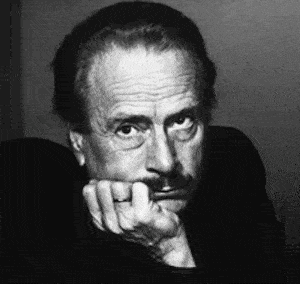
The pop media philosopher who coined “the global village” and “the media is the message” is often credited with having foreseen or advocated many of the digital media which superseded him.
But the late Marshall McLuhan was more an observer than a proto-digital champion, I heard at a series of seminars to commemorate this centenary year of his birth at Bristol, England’s Watershed on Thursday.
After calling a moment’s silence for Steve Jobs, seminar curator Simon Poulter described McLuhan, who wrote and spoke in the 1950s and 1960s but was Wired magazine’s “patron saint” in the 90s, as both “a genius and a charlatan” for his grand aphorisms, which were a mixture of prophesy and quixotic, poetic free-thinking.
On the former count, though many McLuhanisms were merely of their day, I believe application of others to today’s modern media remains possible…
- In Understanding Media, McLuhan noted the difference between “hot” and “cool” media. A “hot” medium is one that caters to a single sense or is otherwise less engaging thanks to its linearity, while a “cool” medium like TV requires more effort to understand meaning and require more intense participation. If TV was the “cool” medium of its day, however, what would McLuhan had made of the hyperlinked web, where interaction through navigation is the default action, and touchscreen tablets, which are the most involving and tactile interfaces yet? How much cooler can media get?
- If we do not now live in a time when “our central nervous system is tecnologically extended to involve in the whole of mankind and to incorporate the whole of mankind in us”, as McLuhan also wrote in Understanding Media, then I’ll eat my hat live on Facebook whilst reading my followers’ tweets and simultaneously listening to radio news from a distant land (if you get my meaning).
- McLuhan also wrote: “Media come in pairs, with one acting as the ‘content’ of the other.” It’s an observation borne out, still, in the metaphor of the computer “desktop”, the rebirth of the CD as iTunes and the reimagination of newspapers, magazines and books in virtually their original image on tablet computers.
So far, so applicable. But not necessarily all good.
“McLuhan wasn’t the guru of new media technology,” composer Bernhard Living, who remixed several McLuhan interviews for a supporting series of ambient musical pieces, told the seminars. “A guru is someone who advocates new technologies. He channeled technologies and was a soothsayer, but he gave warning signs; he guided us.”
Indeed, McLuhan believed, far from engaging audiences more with news, for example, our newer media might even disconnect us…
“Vietnam is the first hot war to be shown on a cool medium,” he said at the time, in a film screened at Watershed, Picnic In Space, a trippy work in which McLuhan and an intellectual friend ruminate whilst laying in a Canadian field. “War is so hot, viewers can’t bear it. The less hot you are, surely the better off you are.”
In other words, highly participatory, “cool” media deaden our horror at news events by allowing us to interact deeply, to swipe undesirable stories away at the flick of a finger, or to edit certain news out of our Daily Me.
“As people become more involved in each other, the more need they feel for distance between themselves,” McLuhan also said in that film. “This is a space in which you merge privately with everybody else. You have no private point of view.”
That can now be regarded as an observation of the effects not just of globalisation but of social networking and the consequence of consensual, co-created identity. So what would McLuhan have made of today’s media?
“What he recognised, by the 60s, was the challenge of scale – what happens when you reach across great distances and connect with people at great distances that were previously unimaginable,” former Channel 4 cross-platform commissioner Matt Locke told the Watershed seminars. “He noticed these patterns in a way that absolutely resonates in the 21st Century.
“Most of the cultural shocks we are facing now are all to do with the transgression of data from one context to another in a way that is almost unconscious for actors – Wikileaks, the Arab Spring. The task for a McLuhan in the 21st Century is to map those patterns.”
Here are some further, lesser-known McLuhanisms I cribbed from Living’s recordings on Thursday…
“Private man has been scrapped, corporate man is back. At high speeds, the private outlook of the private individual with his personal point of view is scrapped by the virtual speed of electric information around him.”
“A world of echo in which … people instinctively feel that everything affects everything. Simultaneously, the most profound things and the most superficial things are the same.”
“Most innovations were killed off all at once at birth. (One should) counter the assumption that anything I describe i approve of, that anything that is there must be good therefore it wouldn’t have happened. I wonder…”